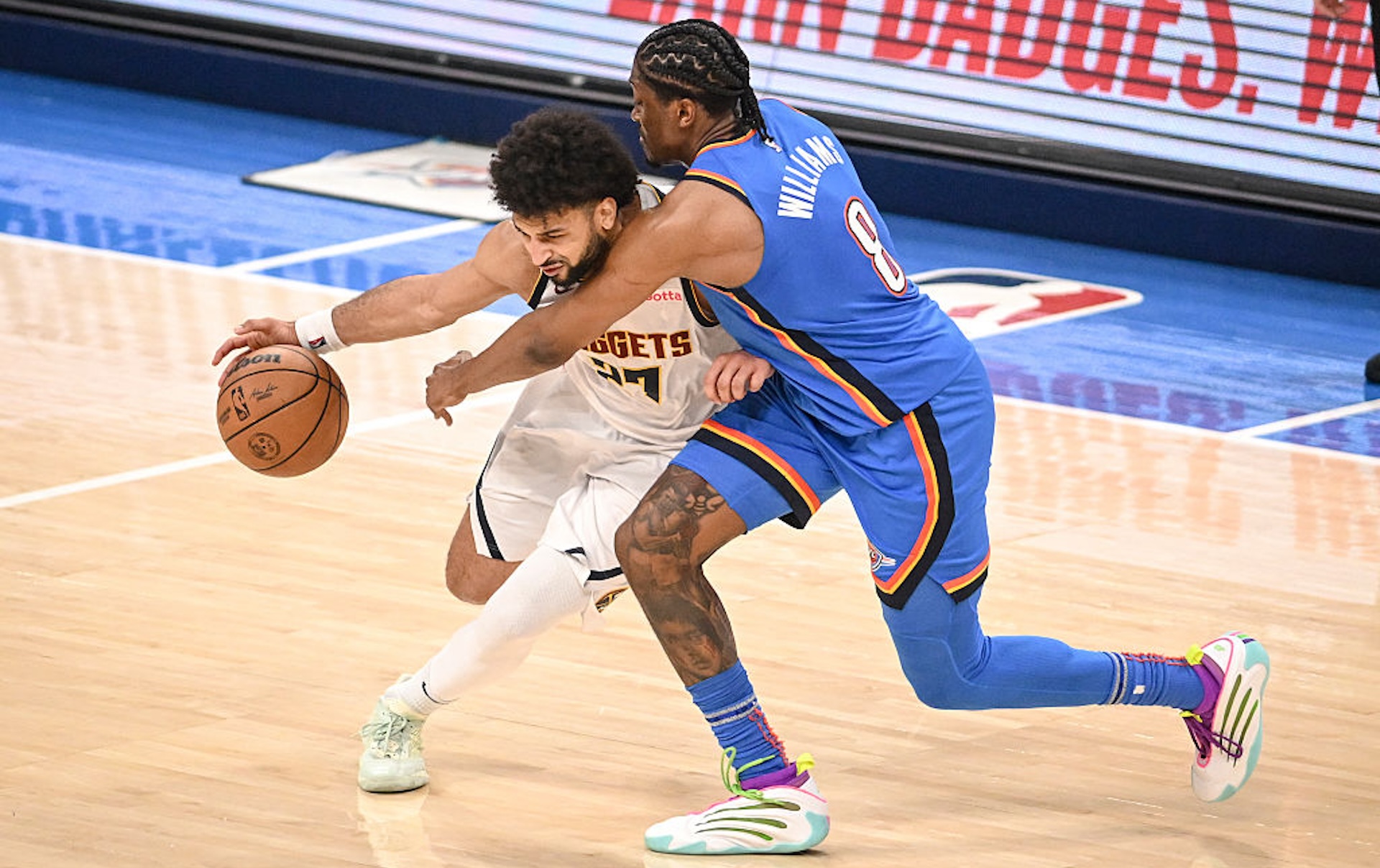It took the Oklahoma City Thunder about four minutes to kill the Denver Nuggets dead. With just over three minutes left to play in the second quarter of Sunday's Game 7, the Thunder were leading, 42-41. By the time there was 10:59 left to play in the third quarter, they were up 66-46 and the game was undeniably over.
The Thunder do this a lot. A team will start out fairly well against them, maybe even keep the game close all the way into the fourth quarter, but then OKC will turn on what Patrick Redford calls the steals-and-dunks machine, which does exactly what it says on the box. The Thunder will pick a moment in the game to raise their always-high defensive intensity to another level, and before the other team can really understand what's happening, they have been buried under an avalanche of turnovers and transition buckets. The Thunder turned Denver over five times during that four-minute stretch of Game 7, shot 9-of-10 from the field, and outscored them 24-5. It just kept going like that for the rest of the game, until the Nuggets emptied the bench and voluntarily initiated garbage time with 9:36 left to play.
When a team wins 68 games in the regular season, you go looking for an explanation, because NBA teams don't get that good without having something truly special about them. The Bulls had Michael Jordan, the Warriors had Steph Curry's gravity and the Lineup of Death, the Celtics had the Big Three and then Mazzullaball, and on and on. A lot of the NBA's greatest teams represent some sort of evolutionary step forward, either tactically or athletically, which makes the Thunder somewhat of a unique case, because what makes them special is their ability to perform the most basic requirement of NBA basketball at a high level: They try really hard and they never stop.
You can see what makes this team great by looking more closely at what causes them to occasionally struggle. The Thunder were pushed to a seventh game by a 50-win Nuggets team with an imbalanced roster, because they repeatedly struggled to score against a rudimentary zone defense and because their second and third options behind Shai Gilgeous-Alexander shot the ball poorly. There were times during this series where you could watch the Thunder spend multiple possessions meekly passing the ball around the edges of Denver's zone in search of a player who actually wanted to attack confidently, and wonder how it is that these guys finished the regular season with the second-best net rating in NBA history. The answer is that the Thunder's effort and intensity is so high that it can swallow up whatever disadvantages might exist elsewhere. This makes them a somewhat inverted version of the classically great team. Curry's best Warriors teams could survive stretches of loose defense and lazy turnovers because their talent would eventually win out, but it's never really a three-point barrage or SGA heater that widens the gap for the Thunder. It's ravenous effort.
"Physicality" is the watchword of these NBA playoffs, and the Thunder are the reason why. When other coaches explain a win or a loss by claiming that his guys did or did not establish physicality, it can be hard to tell exactly what he's talking about. It often feels like the word is deployed lazily: If your team won, it's because they were more physical. If they didn't, it's because they weren't, and that's all you need to know. But the Thunder actually show you, on more possessions than any other team is willing to, what "physicality" actually means. You can see it in 6-foot-5 Alex Caruso clutching and harassing and ball-denying 7-footer Nikola Jokic so forcefully that the reigning MVP only managed to get nine shots up in a Game 7. You can see it in Lu Dort leaping around and through every screen that comes his way. You can see it in how interchangeably fierce the Thunder's coterie of three-and-D guys manages to be.
What sticks out about the Thunder's performance in this series is not any masterful individual performance or iconic shot, but how often the Thunder got back in transition defense. What I will best remember is a moment from the end of Game 6, when the Thunder turned on the steals-and-dunks machine while down double digits. Trailing 102-88, Jalen Williams, who had played like shit all night, stripped Christian Braun clean and went the other way for what should have been an easy dunk. He somehow missed it, and the Nuggets dribbled into a 5-on-4 in the other direction while Williams was still gathering himself out of bounds behind Denver's basket. Jamal Murray drove the ball all the way to the rim, but as he got ready to go up for a layup, a Thunder player poked the ball away from behind, sending it out of bounds. That player was Williams, who had sprinted all the way back into the play.
That's what it takes to play and win like the Thunder do: a level of effort that never falters—not when they are ahead, not when they are down, and not even when you've just punctuated one of the worst shooting performances of your life with a humiliating missed dunk. If you try really hard, you can win a lot of games. It sounds simple enough, but if it were, everyone would do it.






